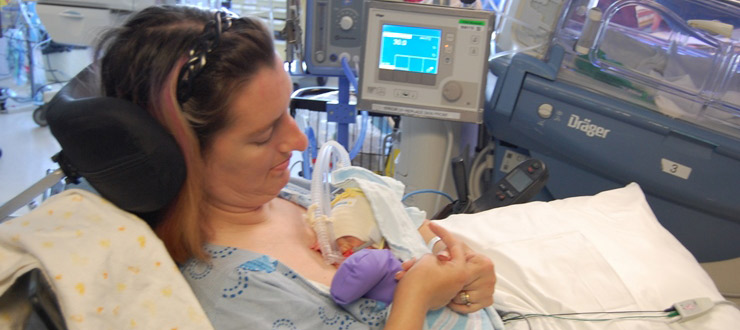
Quiet time in the General Campus NICU helps babies like Eva Bisson, cuddling with her mom, Sara Bisson, to rest and continue brain development.
If you’re talking loudly in the Neonatal Intensive Care Unit (NICU) these days, you’re going to get shushed.
The NICU has started a campaign called ‘Help Us Sleep Healthy,’ or “HUSH,” to promote a quiet environment where babies can sleep.
Like the Quiet at Night campaign at The Ottawa Hospital, the idea is that sleep helps patients heal. But, for premature babies, quiet time is more about development than recovery.
Research has shown that, because their brains haven’t quite finished developing by the time they’re born, premature babies are more likely to have developmental delays, autism, cerebral palsy or learning disabilities.
“By creating an environment that mimics the womb, we’re protecting brain growth and development,” said Registered Nurse Sarah Henderson, who co-chairs the NICU Developmental Care Committee. “Giving them that quiet time helps decrease the severity and the rate of poor neurological outcomes.”
In June, the campaign was rolled out to educate staff and parents on the unit about the benefits of a quiet environment. The unit has a SoundEar as a visual reminder of how noisy the unit is at any given time, and has asked care teams doing rounds to use quiet voices, speak one at a time, and avoid talking right beside the babies.
The unit has declared 1 p.m. the start of a daily ‘quiet hour,’ when unit doors are closed and the lights are dimmed.
Data was collected from the SoundEar for a week in April, and then again for a week in July. The July data showed a 23 percent reduction in the average volume of noise, said Clinical Manager Janet Brintnell.
To make the campaign successful, said Henderson, team members and families on the unit needed to create an environment where people didn’t feel bad asking others to be quieter.
“We gave each other permission to shush each other, to say, ‘Hey guys, it’s getting too loud in here. We need to be quieter,’” she said.

Support patient care and research at
The Ottawa Hospital


 To reset, hold the Ctrl key, then press 0.
To reset, hold the Ctrl key, then press 0.